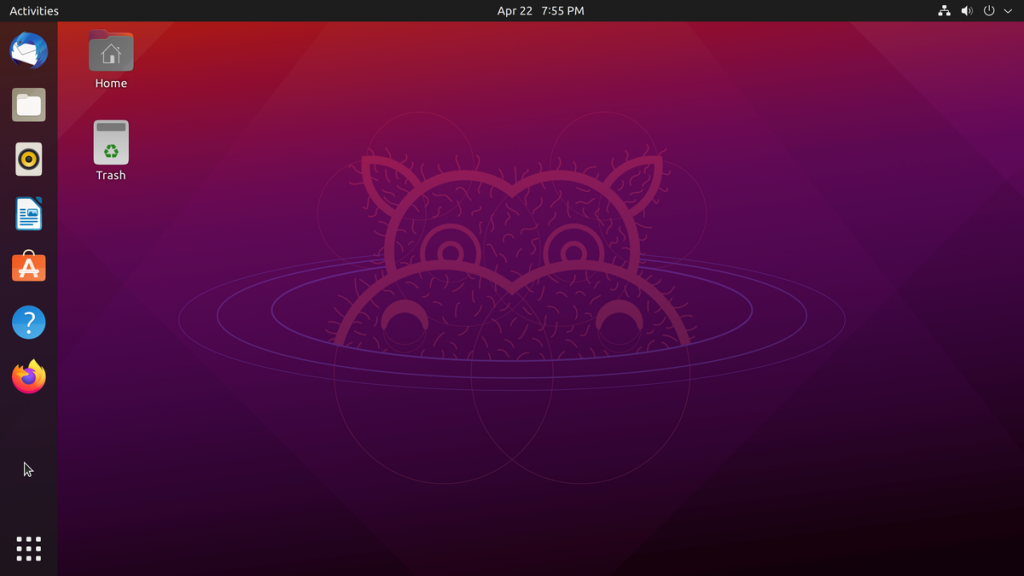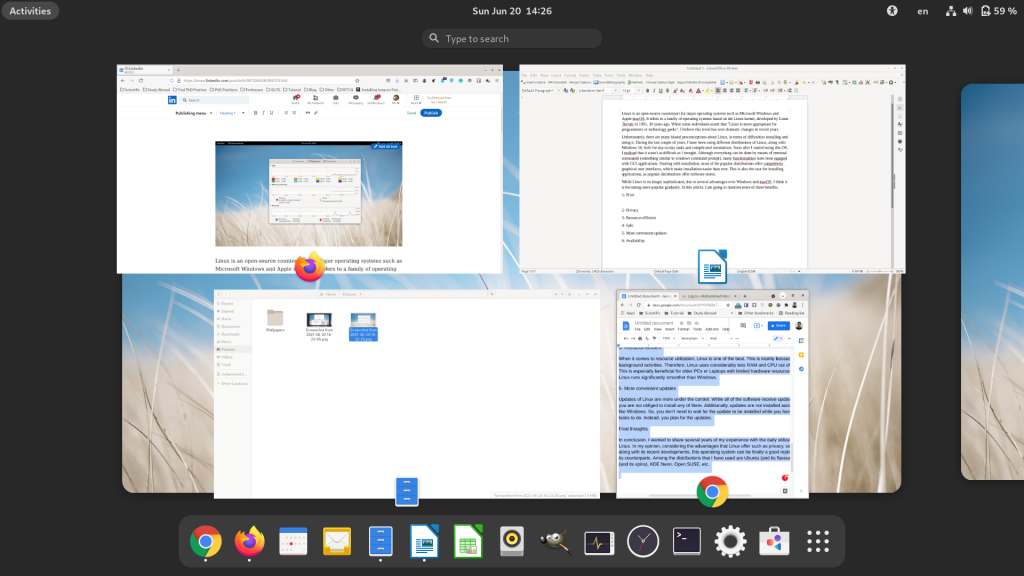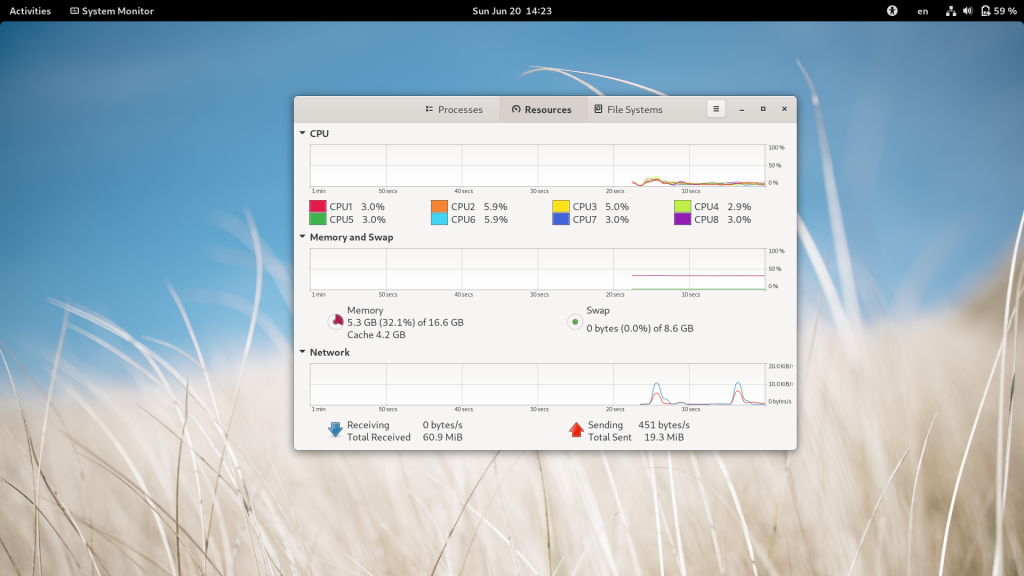Linux is an open-source counterpart for major operating systems such as Microsoft Windows and Apple macOS. It refers to a family of operating systems based on the Linux kernel, developed by Linus Torvals in 1991, 30 years ago. While some individuals assert that “Linux is more appropriate for programmers or technology geeks”, I believe this trend has seen dramatic changes in recent years.
Unfortunately, there are many biased preconceptions about Linux, in terms of difficulties installing and using it. During the last couple of years, I have been using different distributions of Linux, along with Windows 10, both for day-to-day tasks and complicated simulations. Soon after I started using this OS, I realised that it wasn’t as difficult as I thought. Although everything can be done through terminal commands (something similar to windows command prompt), many functionalities have been equipped with GUI applications. Starting with the installation process, most popular distributions offer completely graphical user interfaces, making it easier than ever. This is also the case for installing applications, as popular distributions offer software stores.
While Linux is no longer sophisticated, I think it is becoming more popular due to several advantages over Windows and macOS. In this article, I am going to mention some of these benefits.

1- It is free
Should you want to use Windows, normally you need to pay $100-$200 for a licence. If you prefer macOS, then a whole new device is needed to be bought. Linux, on the contrary, is completely free. You can simply download a copy of the OS and install it as many times as you want, on as many devices as you want. This is also true for programs. While Microsoft Office or Photoshop are only available at extra cost, alternatives to them are freely available for Linux. Despite being a little bit inferior regarding their quality or functionalities, many of these alternative programs already work great. In addition, since they are open-source, they are getting better and better with every update.
Below you can see some of the alternatives to Windows applications:
- Libre Office can easily replace Microsoft Office.
- GIMP can replace Photoshop.
- Ghostwriter or Focuswriter are good Text editors.
- Inkscape is a great replacement for Illustrator.
- Darktable easily replaces Lightroom.
- Kdenlive is a good alternative to Premiere Pro.
- DaVinci Resolve is also another perfect alternative to Premiere Pro and After Effects.
- Audacity is a great all-around soundwave editor.

2- Privacy and security.
Linux does not collect data for commercial purposes. Microsoft and Apple usually collect a tremendous amount of data such as the history of files opened or websites visited. By using Linux, your data are highly likely to remain private, as it does not have such policies.
On the other hand, Linux based systems are more secure against hacks, viruses, and malware. Generally speaking, owing to higher popularity, Windows and macOS are at a higher risk of getting hacked. Moreover, again just because of a larger share of the market, viruses and malware are more likely to be developed for them rather than for Linux. Finally, most software is open-source, which are peer-reviewed by many developers constantly, and thus are more secure.
3- Resource-efficient
When it comes to resource utilization, Linux is one of the best. This is mainly because of fewer background activities. Therefore, Linux uses considerably less RAM and CPU out of the box. This is especially beneficial for older PCs or Laptops with limited hardware resources, on which Linux runs significantly smoother than Windows.

4- More convenient updates
Updates of Linux are more under the control. While all of the software receive updates regularly, you are not obliged to install any of them. Additionally, updates are not installed automatically, like Windows. So, you don’t need to wait for the update to be installed while you have a lot of tasks to do. Instead, you plan for the updates.
Final thoughts
In conclusion, I wanted to share several years of my experience with the daily utilization of Linux. In my opinion, considering the advantages that Linux offer such as privacy, security, etc. along with its recent developments, this operating system can be finally a good replacement for its counterparts. Among the distributions that I have used are Ubuntu (and its flavours), Fedora (and its spins), KDE Neon, Open SUSE, etc.
Linux is definitely better than windows
русские жены порно онлайн https://epporno.club/ найти онлайн порно
смотреть порно онлайн бесплатно без регистрации [url=https://epporno.club/search/%D1%81%20%D1%80%D0%B0%D0%B7%D0%B3%D0%BE%D0%B2%D0%BE%D1%80%D0%B0%D0%BC%D0%B8/]порно ролики с разговорами бесплатно [/url]
[url=https://appistoki.com/estimates-vs-costs-in-project-management/#comment-3210]порно грязный разговор с сыном[/url]
[url=https://xn--k9j703lrer.com/matsudatakeshi-meigen/#comment-276542]порно hd видео с разговором[/url]
[url=http://www.peopleskills.se/beteende/professionellt-beteende/attachment/images-2/#comment-257436]смотреть бесплатно порно с разговорами[/url]
[url=http://legalbbs.cn/forum.php?mod=viewthread&tid=28703&extra=]порно крупно с разговором на русском языке[/url]
[url=http://prettyincake.com/2019/09/02/hello-world/#comment-9413]грязные разговоры русских мам порно[/url]
[url=https://yepnews.ru/materials/1971/]порно видео крупный с разговором[/url]
[url=http://sasuanime.webpin.com/?gb=1#top]паром порно с разговорами[/url]
[url=https://vivirsindrogas.com/2021/08/16/hello-world/#comment-1969]порно много разговоров[/url]
[url=http://sawyerislandcharters.com/fishing-report-6-8/#comment-3402]муж и жена порно с разговорами[/url]
[url=http://www.theblueknight.host-ed.me/forum/index.php?topic=9312.new#new]порно русское с разговорами огромными[/url]
f05_d4a
порно домашка большая https://devkaeb.online/ порно молодую русскую толпой
красивое индийское порно [url=https://devkaeb.online/categories/%D0%98%D0%BD%D1%86%D0%B5%D1%81%D1%82/]порно видео инцест сын мать дочь [/url]
[url=http://moroznik.in.ua/#comments]красивые девушки безо всего порно[/url]
[url=https://mstiefenhofer.de/hello-world/#comment-19233]смотреть русское порно без[/url]
[url=http://axorabooks.com/product/penguin-the-bravest-cat-the-true-story-of-scarlett-puffin-young-readers-level-2/#comment-583467]порно веб камера анал[/url]
[url=https://www.eastwestguitars.com/lorem-ipsum-dolor-sit/#comment-116069]домашнее порно в рот[/url]
[url=https://totalbeasts.com/best-ping-pong-paddles-for-beginners/#comment-3183]домашнее порно зрелых женщин[/url]
[url=https://ezeconcretedesigns.com/2021/06/hello-world/#comment-758]русское порно зрелых полных женщин[/url]
[url=https://margaretvillebarn.com/hello-world/#comment-6755]смотреть интересное порно[/url]
[url=http://maramey.com/2021/03/how-to-maintain-myself-after-hard-work/#comment-4084]дочь порно скачать телефон[/url]
[url=http://gamesinfo.prv.pl/2018/11/29/184/#comment-1397]порно анал в сауне[/url]
[url=http://madewithemotion.com/hello-world#comment-89849]девушка нюхает порно[/url]
08_7a5d
Way cool! Some very valid points! I appreciate you writing this post
plus the rest of the website is extremely good.
порно онлайн шлюхи [url=https://babaeb.xyz/]БабаЁБ порно[/url]
самая секс девушка порно [url=https://babaeb.xyz/porno/%D0%9F%D0%BE%D1%80%D0%BD%D0%BE+%D0%9C%D0%B8%D0%BB%D1%84%20%D1%81%D0%B5%D0%BA%D1%81%20%D1%81%20%D0%B3%D0%BE%D1%80%D1%8F%D1%87%D0%B8%D0%BC%D0%B8%20%D0%BC%D0%B0%D0%BC%D0%BE%D1%87%D0%BA%D0%B0%D0%BC%D0%B8%20%D0%BE%D0%BD%D0%BB%D0%B0%D0%B9%D0%BD/]ляжки милфы [/url]
[url=http://www.lpc4350.com/demo-board?page=172#comment-9328]русское порно зрелых женщин[/url]
[url=https://pinksquare.media/10-free-directories-to-help-increase-your-serp/#comment-2366]смотреть порно зрелые жопы[/url]
[url=http://ujkkheu.mblg.tv/namitan/entry/960/#comments]порно фильмы онлайн новинки в качестве[/url]
[url=http://mycavy.ru/forum/index.php?/topic/6765-%D0%B5%D1%81%D0%BB%D0%B8-%D1%84%D0%BE%D1%80%D1%83%D0%BC-%D0%BD%D0%B5-%D0%BF%D1%83%D1%81%D0%BA%D0%B0%D0%B5%D1%82-%D0%B2%D0%B0%D1%81-%D0%B2-%D0%B2%D0%B0%D1%88-%D0%B0%D0%BA%D0%BA%D0%B0%D1%83%D0%BD%D1%82/#comment-17182]скачать порно русское пк[/url]
[url=http://sga.kanagawa-ippin.jp/farmer/comment/26/74/]порно дочь смотреть онлайн бесплатно[/url]
[url=https://www.hollolannasta.com/yhteystiedot/?x118172=-615439&Action=Confirm&%2Apsid=1645536498-615442-c4d6c3a42105bc9b35dea8887d90aa0a&R=176353]больший попы ролики порно[/url]
[url=https://ibissandco.com/tax-tips/budget-2021-universal-credit-fuel-air-passenger-fuel-and-alcohol-duties-reduced/#comment-88817]частное домашнее порно смотреть бесплатно[/url]
[url=https://asahellman.se/blogg/hostvandring-fran-abisko-genom-karsavagge#comment-8421]порно трусики зрелые[/url]
[url=https://www.dancedating.ch/adm_program/modules/guestbook/guestbook.php?headline=G%C3%A4stebuch]трахает бесплатное порно онлайн[/url]
[url=https://septemmaria.com/2020/05/15/419/#comment-13861]порно планом зрелые[/url]
4f02_5d
Hmm is anyone else encountering problems with the images on this blog loading?
I’m trying to find out if its a problem on my end or
if it’s the blog. Any feedback would be greatly appreciated.
Excellent beat ! I would like to apprentice while you amend your web site, how can i subscribe for a blog website?
The account aided me a acceptable deal. I had been a little bit
acquainted of this your broadcast offered bright clear concept
русское порно зрелых с разговорами бесплатно https://mnogosexa.online/
скачать порно жесть [url=https://mnogosexa.online/search/%D0%A1%D0%BA%D1%80%D1%8B%D1%82%D0%B0%D1%8F%20%D0%9A%D0%B0%D0%BC%D0%B5%D1%80%D0%B0/]видео порно мать сыном скрытое камера [/url]
[url=https://www.nakamurayaryokan.com/publics/index/5/step=confirm/b_id=9/r_id=1/fid=cc4956df8456a733cf9d776f6e0ed91f]смотреть частное домашнее порно[/url]
[url=http://aparatosortopedicosavicer.mex.tl/?gb=1#top]домашнее порно толстых женщин[/url]
[url=http://hmv2.homment.com/F3QKgN3AyNqJEeKg6hev]порно девушки в автобусе[/url]
[url=https://hipnomedia.com/foro/post1534714.html#p1534714]порно фото зрелая дала[/url]
[url=https://tubamenosu.blog.ss-blog.jp/2020-07-21?comment_success=2022-03-20T14:42:38&time=1647754958]украденное домашнее порно[/url]
[url=http://www.tantadaran.se/uncategorized/hello-world/#comment-20707]порно видео красивые студентки[/url]
[url=https://www.eastwestguitars.com/lorem-ipsum-dolor-sit/#comment-123874]порно молодые красивые киски[/url]
[url=https://allatka.eoldal.hu/cikkek/vendegkonyv.html#block-comments]русские первые анал порно видео[/url]
[url=http://community.bylund-automotive.com/viewtopic.php?t=3116]скачать порно со зрелыми бесплатно[/url]
[url=http://www.intellectualpropertyaid.org/#comment-210501]руки молодой порно[/url]
88794ea
Why should we turn to Linux in 2021 – Mohammad Hasani
[url=http://www.g2511890kc07r5vi4yds7wd5xpgtn360s.org/]ujwcjrizg[/url]
jwcjrizg http://www.g2511890kc07r5vi4yds7wd5xpgtn360s.org/
ajwcjrizg